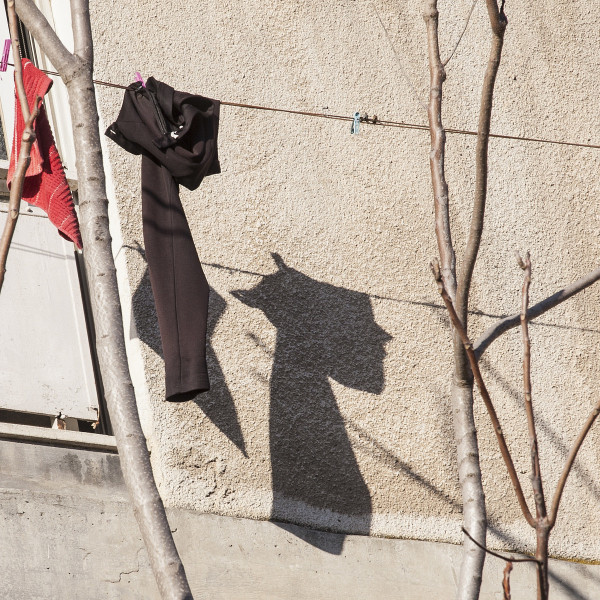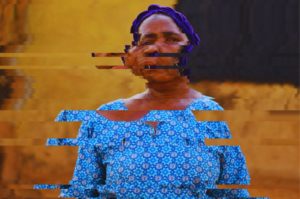Car headlights, like several pairs of feline eyes, go back and forth. Beyond the telephone pylons and the electric poles on both sides of the road, a grey dawn is emerging through nebulous horizons.
The bus stops at the junction where the tarmac meets the sandy rutted street road. I get off with a deep breath. In the bus, the conductor had kept shouting and picking random arguments with the passengers. To make matters worse, a fat woman whose snoring made a dull scraping sound, hemmed me into the side of the window. Otherwise, the passengers were quiet—they tend to be in the morning—but for the conductor. He must have taken an early morning shot of ogogoro.
I think I will have to stop sleeping at the office. The strain of being a cartoonist for five papers, among other things, is that my epilepsy might return. Sometimes I can swear that I can feel myself switch off in the middle of drawing, the way one switches off a television. I would feel a sudden blacknesss cloud me over, and it would seem as though I were nothing but a floating molecule, an oblique speck, in a shroud of black.
Beatrice convinces me that it is just paranoia that goes as far back as childhood. But then—then . . . I am afraid of this new heaviness in my legs as I bound up the street. As usual, the road is under construction, hills of red sand heaped here and there; droning yellow caterpillars; sweating constructions workers everywhere. The mustachioed Arab contractor, in faded blue jeans and striped t-shirt, stands by a white pick-up jeep smoking and shouting orders in a clumsy voice.
The houses on the street are mostly old one-story houses and new four or five story houses. There is this house on the left side of the road, just a few meters from the block of flats where I live. Everyday, as I pass by, it seems to be locked up; yet people who had lived long enough in the street to have an opinion say that it used to be the house of a rich man that is now inhabited by one of the man’s sons. He has consumption, a result of his having been used for ritual sacrifice by his father, they claim. But I doubt that. Since I moved into my new flat a year ago, the house has remained ghostly and devoid of any human presence.
I walk into the courtyard and am hailed by Ndubisi, Madam Choice’s cousin, who is going out. They live on the second floor. Madam Choice owns the restaurant where I sometimes eat lunch or dinner or both.
“Good morning, Joe,” he says.
“Good morning. Where to this early morning?”
“Oh . . . to Asaba.” He replies slowly, as though he is not sure. “But don’t let my Auntie know, in case she asks you.” I nod. He is probably going to do some work there to make some money on the side. I like Ndubisi. He reminds me a lot of my younger self, struggling without a father from a young age, doing some odd jobs and high-risk illegal ones to make ends meet.
I open the door to the flat and enter. The parlor is disheveled. The bathroom towel is on the sofa. The chaise lounge is littered with rumpled clothes and wrappers. The rug looks unswept with two empty bottles of Baron de Valls and crushed cigarettes. This is unlike Beatrice. What is she doing?
She called last night to say that she wouldn’t be going to the hospital, and I remember thinking that was unusual for a young doctor like her. Her superiors require her to work the night shifts. On nights when I don’t work overtime at the office, and she is absent from bed, the room seems to lose intimacy as if, without her, it has ceased to become a room but a large open space in the wilderness.
Because of the nature of her work, we make love in the morning or afternoon. She talks a lot during lovemaking. Each time, she tells me that I am harder than her former boyfriend, someone named Oki, who is from Delta. They started dating in medical college. Oki was quite mad, she tells me, but he was very intelligent. His madness, or what resembled it, was what created a rift between them. He fell in love with slapping her cheeks quite frequently instead of with her as a person. At other times she would say I am harder than Oki because when we make love I seem to be angry at something. And that ‘something’ is what she can’t quite place.
I want to join her in bed, not to make love, just to feel her presence, that intimacy, there. I open the bedroom door and the sight, which should normally shock me, makes me smile.
***
I have only been in love with two women in my life. The first was as a boy struggling with epilepsy. The second is—or was, now—Beatrice. I even lost my innocence to her. In my twenty-six years of existence, I have been through a few disasters, or, rather, I should have said ‘things.’ What I am seeing now seems to be one of those things. Yet, as a human being, I feel rage and anger. I feel it as one feels when one knows one has to handle a mad man and yet knows that it makes no difference. The mad man will still scream at the top his lungs and remain mad. In other words, I want to control this anger. I want to laugh at it, but can’t.
As I watch Beatrice scramble down from bed, her eyes . . . (I do not know what to call that look), murmuring my name, ‘Joe, Joe’, and watching her lover leave hastily, I feel like snatching the china on the bedside table and see it go to pieces on her head. Was it not the morning before that I woke up, pulled her close to me and nibbled at her neck and rubbed her breasts? Her nipples protruded through her satin night dress, and she pushed me off. When I asked Why, she said My period.
I stare at her and smile and walk out of the house. The construction workers are still at work on the road. I murmur greetings to a guy I know among the laborers. I hope one or two beer parlors will be open.
**********
Image by Ze’ev Barkan via Flickr
About the Author:
 Chimezie Chika’s work has been published in The Kalahari Review, Kaanem Journal, and various online platforms and anthologies. He was a 2015 Writivism Workshop participant.
Chimezie Chika’s work has been published in The Kalahari Review, Kaanem Journal, and various online platforms and anthologies. He was a 2015 Writivism Workshop participant.










seun March 20, 2016 20:29
Humorous. Thank you for this awesome piece!